Hyde Surname Ancestry ResultsOur indexes 1000-1999 include entries for the spelling 'hyde'. In the period you have requested, we have the following 1517 records (displaying 101 to 110): Single Surname Subscription | | | Buying all 1,517 results of this search individually would cost £8,722.00. But you can have free access to all 1,517 records for a year, to view, to save and print, for £100. Save £8,622.00. More... |
These sample scans are from the original record. You will get scans of the full pages or articles where the surname you searched for has been found. Your web browser may prevent the sample windows from opening; in this case please change your browser settings to allow pop-up windows from this site. Liegemen and Traitors, Pirates and Spies
(1550-1552)
The Privy Council of Edward VI was responsible for internal security in England and Wales, and dealt with all manner of special and urgent matters
HYDE. Cost: £4.00.  | Sample scan, click to enlarge

| Ludlow Guild: Tenants in Shropshire
(1552)
The Fraternity or Guild of Palmers, founded in Ludlow, Shropshire, possessed extensive property in Ludlow itself and nearby. This survey, taken in the 6th year of king Edward VI, surviving in the records of the Court of Augmentations, lists the tenants of property in Ludlow and its liberties; those of the burgages in Ludlow; of 'divers tenements or burgages, greatly in ruins' with a nominal value of £2 11s 8d per annum, but 'totally in decay', worth 3s 4d for the soil; the sock rents; and various tenements in Ludlow and elsewhere in Shropshire; in Herefordshire; and in Worcestershire.HYDE. Cost: £6.00.  | Sample scan, click to enlarge

| Officers of the Royal Household
(1553)
King Edward VI died 6 July 1553 and was buried 8 August following. The accounts of the funeral expenses were prepared by sir Edward Waldegrave, knight, one of queen Mary's privy coucil, and master of her Majesty's great wardrobe. The expenses included the purchase of 'blacke clothe boughte for the buriall' to furnish mourning for every officer and servant of the late king's household, and these accounts list all the officers, department by department, by name. Most officers were provided with 4 yards of cloth, and their clerks and servants 3 yards each: greater dignitaries were allowed from 7 to 16 yards; sir Edward himself received 10. The total cost of the 9,376 and a half yards of cloth was £5946 9s 9d.HYDE. Cost: £6.00.  | Sample scan, click to enlarge
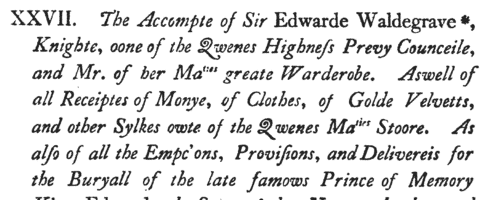
| Tenants, founders and incumbents of Lancashire chantries
(1546-1554)
Chantries were established to perform services for the souls of their founders and other faithful dead, including annual obits and anniversaries at which alms were usually distributed. The chantries could be at an existing altar in a parish church, a new altar in a side chapel of an existing church, in a new chapel in the churchyard or some miles from an existing church: few were founded before 1300, and most date from 1450 to 1500. Hospitals were places provided by similar foundations to receive the poor and weak; there were also religious guilds, brotherhoods and fraternities, and colleges (like large chantries at which three or more secular priests lived in common). An Act of Parliament of 1545 gave king Henry VIII the power to dissolve such chantries, chapels, &c., the proceeds to be devoted to the expenses of the wars in France and Scotland. Commissioners were appointed 14 February 1546 to survey the chantries and seize their property, and from 1546 to 1548 the commissioners produced these certificates giving brief details of the establishment and nature of each foundation, with an inventory of valuables and rental of lands. The individuals named in the certificates are thus the founder, the present incumbent, and the tenants whose rents provided the chantry's income. All the surviving certificates for Lancashire were edited by the Reverend F. R. Raines for the Chetham Society, and published from 1862.HYDE. Cost: £6.00.  | Sample scan, click to enlarge

| Tradesmen of York
(1272-1558)
No man or woman could trade in the city of York without having obtained 'freedom' of the city.Their names were recorded on the 'Freemen's Roll', or Register of the Freemen of the City of York, which contains about 19,900 names for this period. A list of names was prepared for each year, the year being here reckoned as starting at Michaelmas (29 September) until 1373, and thence at Candlemas (2 February). Each annual list starts with the name of the mayor and the camerarii or chamberlains. The chamberlains were freemen charged with the duty of receiving the fees of the new freemen; of seeing that only freemen traded in the city; and of preparing this roll, which was compiled from the names on their own account books from the receipts for the fees. There are three groups of freemen: those who obtained freedom after serving out an apprenticeship to a freeman; the children of freemen; and those who claimed freedom by 'redemption', i. e. by purchase or gift from the Mayor and Court of Aldermen.
HYDE. Cost: £2.00.  | Sample scan, click to enlarge

| Common Pleas: Herefordshire
(1558)
Pleas at Westminster Michaelmas term, 5 & 6 Philip & Mary and 1 Elizabeth, 1558. The court dealt with civil cases: debt, detinue, slander, assault, theft, breach of covenant, formedon, novel disseisin, &c. Each case is marked in the margin with the name of the county to the sheriff of which the writs were issued. Most often, but not necessarily, this would be the county of residence of the defendant. This calendar of the original formulaic record in abbreviated Latin on parchment has been made by David Bethell, preserving all individual detail from each case. The Latin text is translated: English phrases and passages are preserved literatim, in bold. CP 40/1176 mm.1-100HYDE. Cost: £8.00.  | Sample scan, click to enlarge
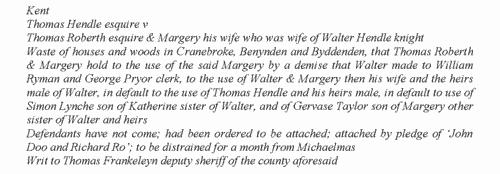
| Common Pleas: London
(1558)
Pleas at Westminster Michaelmas term, 5 & 6 Philip & Mary and 1 Elizabeth, 1558. The court dealt with civil cases: debt, detinue, slander, assault, theft, breach of covenant, formedon, novel disseisin, &c. Each case is marked in the margin with the name of the county to the sheriff of which the writs were issued. Most often, but not necessarily, this would be the county of residence of the defendant: however, London was used for many cases involving defendants in the provinces. This calendar of the original formulaic record in abbreviated Latin on parchment has been made by David Bethell, preserving all individual detail from each case. The Latin text is translated: English phrases and passages are preserved literatim, in bold. CP 40/1176 mm.1-100HYDE. Cost: £8.00.  | Sample scan, click to enlarge
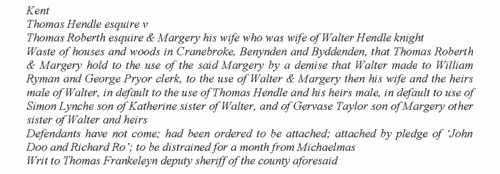
| Herefordshire Entries in the Common Pleas (1558)
The Common Roll of the Common Pleas records litigation before the justices de Banco from throughout England.
HYDE. Cost: £8.00.  | Sample scan, click to enlarge
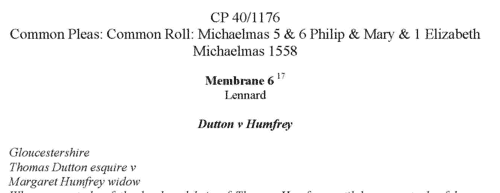
| London Entries in the Common Pleas (1558)
The Common Roll of the Common Pleas records litigation before the justices de Banco from throughout England.
HYDE. Cost: £8.00.  | Sample scan, click to enlarge
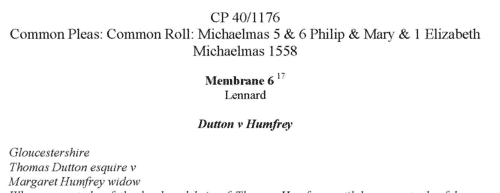
| Oxfordshire Charters
(1550-1559)
A large accumulation of documents preserved in the Bodleian Library, Oxford, formerly constituted the antiquarian collections of Anthony a Wood, Roger Dodsworth, Ralph Thoresby, Thomas Martin of Palgrave, Thomas Tanner bishop of St Asaph, Dr Richard Rawlinson, Richard Furney archdeacon of Surrey, and Richard Gough. A calendar of these was prepared by William H. Turner and published in 1878 under the title 'Calendar of Charters and Rolls preserved in the Bodleian Library'. The word 'charters' is here used in a rather loose sense, including virtually any manuscript or copy of a manuscript, but the bulk of the contents consists of mediaeval deeds of conveyance. Turner's calendar deals with each briefly, naming the principal parties and the nature of the deed, but hardly ever lists the witnesses. Many of these charters were undated (dating of deeds did not become general until around 1350) or so damaged or defective ('mutilated' is Turner's usual description) as no longer to display a legible date. However, he contrived, from the style of the script and/or the nature of the contents, to estimate dates in such cases. The sample scan is from the start of the Bedfordshire list. HYDE. Cost: £4.00.  | Sample scan, click to enlarge
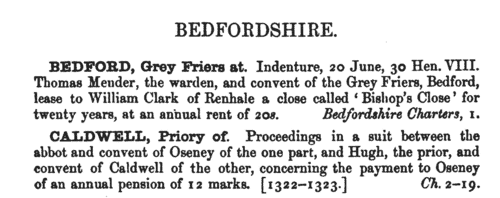
|
Research your ancestry, family history, genealogy and one-name study by direct access to original records and archives indexed by surname.
|












